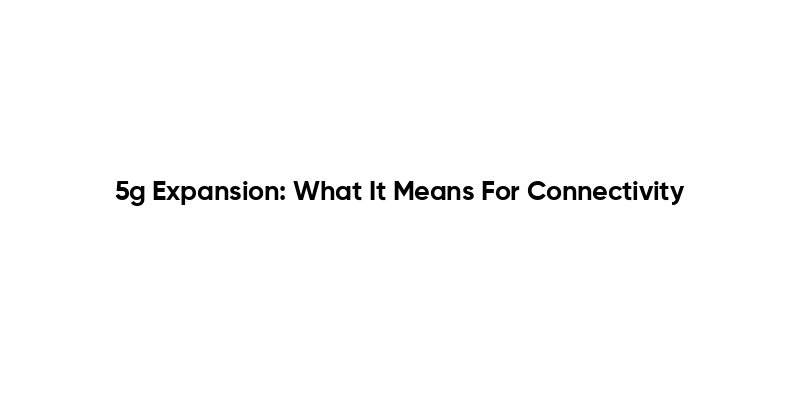The advent of 5G technology marks a significant milestone in the evolution of connectivity, promising to revolutionize the way we interact with the digital world. As we delve into the topic of 5G expansion, it becomes clear that this next-generation network is not just about faster internet speeds; it represents a transformative shift in how devices communicate, industries operate, and individuals connect. With its low latency and high capacity, 5G is set to enhance everything from smart cities to autonomous vehicles, making it a pivotal element in the future of technology.
In this article, we will explore the multifaceted implications of 5G expansion on connectivity. Readers will learn about the technological advancements that enable 5G, the potential benefits for various sectors such as healthcare, transportation, and entertainment, and the challenges that come with its implementation. We will also discuss how 5G can bridge the digital divide, providing access to underserved communities and fostering innovation across the globe.
As we navigate through the intricacies of 5G technology, we invite you to join us on this journey of discovery. Understanding the impact of 5G expansion is crucial for anyone looking to stay ahead in an increasingly connected world. So, stay tuned as we unpack the exciting possibilities that 5G brings to the table and what it truly means for our connectivity in the years to come.
As the world transitions into a more connected future, the expansion of 5G technology is set to revolutionize the way we communicate, work, and live. This article explores the implications of 5G expansion on connectivity through various critical aspects.
Enhanced Mobile Broadband
The most immediate benefit of 5G expansion is the enhancement of mobile broadband services. With significantly higher data rates, users can experience faster download and upload speeds, which is crucial for activities such as streaming high-definition videos, online gaming, and video conferencing. The increased bandwidth allows for more devices to connect simultaneously without compromising performance.
Moreover, the low latency associated with 5G technology means that users will experience minimal delays, making real-time applications more efficient. This improvement in mobile broadband is not just beneficial for individual users but also for businesses that rely on seamless connectivity for their operations.
Internet of Things (IoT) Integration
5G expansion plays a pivotal role in the growth of the Internet of Things (IoT). With its ability to connect a vast number of devices simultaneously, 5G enables smart cities, smart homes, and industrial automation. This connectivity allows for real-time data collection and analysis, leading to improved efficiency and resource management.
For instance, in smart cities, 5G can facilitate traffic management systems that optimize traffic flow based on real-time data. In agriculture, IoT devices connected through 5G can monitor soil conditions and crop health, leading to better yield and sustainability. The integration of IoT with 5G is set to transform various sectors, enhancing productivity and innovation.
Impact on Telemedicine
The expansion of 5G technology is poised to revolutionize telemedicine by providing high-speed, reliable connectivity that is essential for remote healthcare services. With 5G, healthcare providers can conduct high-quality video consultations, share large medical files instantly, and utilize advanced technologies such as augmented reality for remote surgeries.
This improved connectivity not only enhances patient care but also increases access to healthcare services, especially in rural and underserved areas. As telemedicine continues to grow, the role of 5G in ensuring seamless communication between patients and healthcare providers becomes increasingly vital.
Economic Growth and Job Creation
The rollout of 5G technology is expected to have a significant impact on economic growth and job creation. As businesses adopt 5G to enhance their operations, new opportunities will arise in various sectors, including technology, manufacturing, and services. The demand for skilled workers in these fields will increase, leading to job creation and economic development.
Furthermore, the enhanced connectivity provided by 5G can stimulate innovation, allowing startups and established companies to develop new products and services that leverage this technology. This economic boost can lead to a more competitive market and improved quality of life for individuals and communities.
Challenges and Concerns
Despite the numerous benefits of 5G expansion, there are challenges and concerns that need to be addressed. Issues such as infrastructure costs, regulatory hurdles, and potential health concerns related to increased exposure to radiofrequency radiation are significant considerations. Building the necessary infrastructure to support 5G networks requires substantial investment and collaboration between public and private sectors.
Additionally, addressing public concerns about health and safety is crucial for the successful implementation of 5G technology. Transparent communication and research are essential to alleviate fears and ensure that the benefits of 5G are realized without compromising public health.
Future of Connectivity
The future of connectivity is undoubtedly intertwined with the expansion of 5G technology. As we move towards a more interconnected world, the potential applications of 5G are vast, ranging from autonomous vehicles to smart grids. The ability to connect multiple devices with high speed and low latency will pave the way for innovations that we have yet to imagine.
In conclusion, the expansion of 5G technology is set to redefine connectivity, impacting various aspects of our lives. By addressing the challenges and harnessing the opportunities presented by 5G, we can create a more connected and efficient future.
| Aspect | Description |
|---|---|
| Introduction to 5G | 5G is the fifth generation of mobile network technology, designed to provide faster speeds, lower latency, and greater capacity than its predecessors. |
| Enhanced Speed | 5G networks can deliver download speeds up to 10 Gbps, significantly faster than 4G, enabling quicker data transfer and improved user experiences. |
| Lower Latency | With latency as low as 1 millisecond, 5G allows for real-time communication, which is crucial for applications like autonomous vehicles and remote surgery. |
| Increased Capacity | 5G can support a larger number of devices simultaneously, making it ideal for densely populated areas and the growing Internet of Things (IoT). |
| Impact on Industries | 5G is set to revolutionize various sectors, including healthcare, transportation, and entertainment, by enabling new technologies and services. |
| Smart Cities | 5G will facilitate the development of smart cities, where interconnected devices improve urban living through better traffic management, energy efficiency, and public safety. |
| Challenges | Despite its benefits, 5G expansion faces challenges such as infrastructure costs, regulatory hurdles, and concerns over security and health. |
| Conclusion | The expansion of 5G technology promises to enhance connectivity, drive innovation, and transform how we live and work, but it requires careful implementation and consideration of its challenges. |



